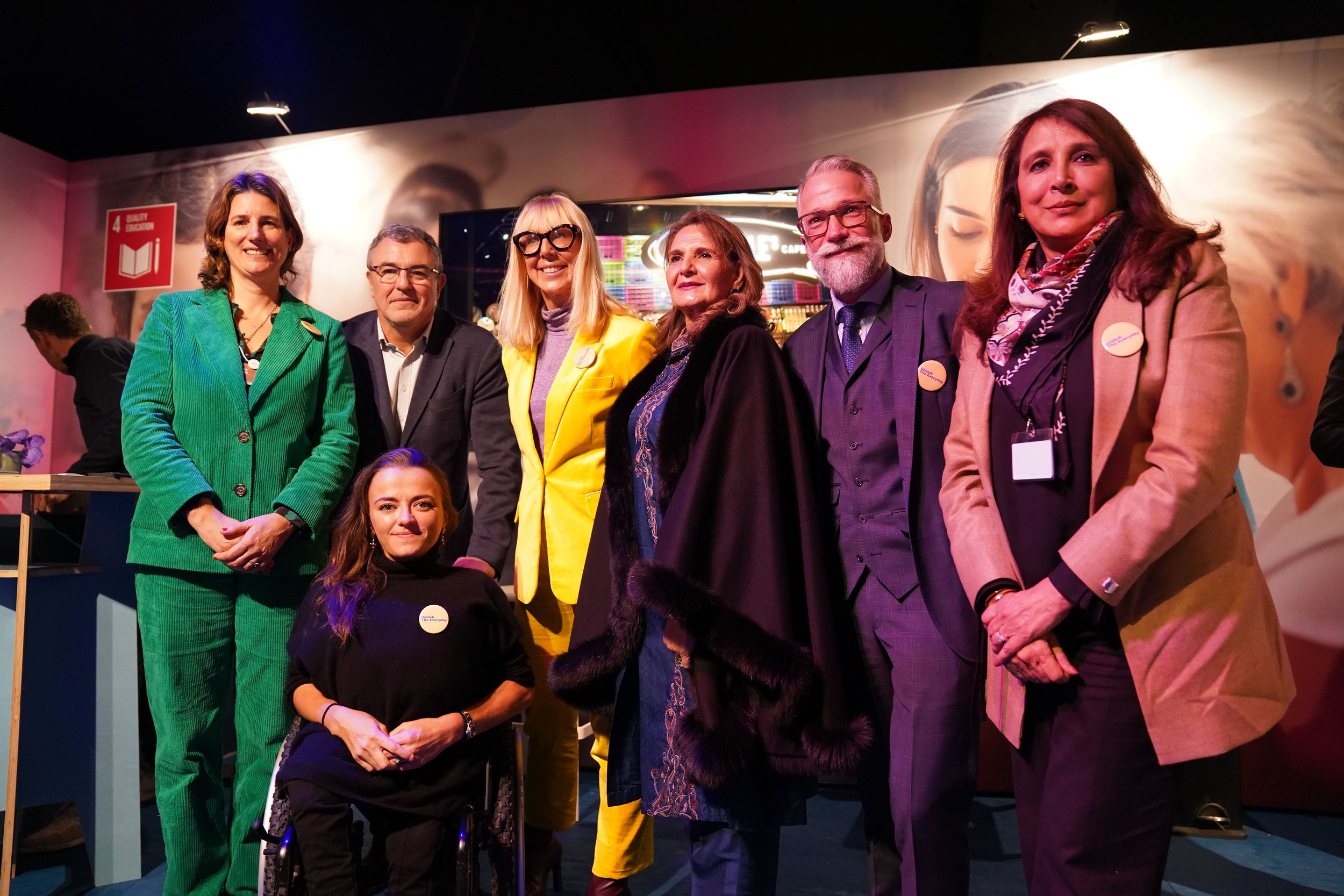First Lady of Pakistan, together with health and development organizations and the private sector, calls for world leaders to prioritize assistive technology access
16 January 2024 – A new global campaign, backed by the Honourable First Lady of Pakistan, Begum Samina Arif Alvi, was launched at the World Economic Forum in Davos, calling for urgent action to improve access to assistive technology for millions of people around the world.
The campaign, ‘Unlock the Everyday’, is the first ever global campaign on assistive technology and aims to raise awareness of everyone’s right to assistive technology – such as wheelchairs, glasses, hearing aids, prostheses and digital devices – no matter where they live, or their income.
Speakers at the Unlock The Everyday launch event.
It is estimated that 2.5 billion people today need at least one form of assistive technology and most people will require assistive technology at some point in their lifetime. However, only 10% of people in low-income countries can access the assistive technology they need, compared to 90% in high-income countries.
The campaign is calling for global action to address this inequity. Without access to appropriate assistive products, millions of people are prevented from earning a living, gaining an education or living independent and fulfilled lives, further compounding existing social and economic inequalities.
The Honourable First Lady of Pakistan, Begum Samina Arif Alvi, is encouraging global leaders to support the campaign and prioritise assistive technology:
“Assistive technology is a bridge that connects individuals with disabilities, ageing populations, and those suffering from non-communicable diseases to a world of opportunities – opportunities for education, employment, and above all, inclusion in society. It is vital to focus on enhancing the affordability and accessibility of high-quality assistive technology, ensuring that individuals from diverse socio-economic backgrounds can equally benefit from these advancements. As a key driver in achieving numerous Sustainable Development Goals (SDGs), this initiative is essential to ensure inclusivity in our path towards 2030. Yet, we have a long road ahead in our journey towards full inclusion. I urge global leaders to prioritize the integration of assistive technology into their national plans and SDG strategies. Let’s work together to build a more inclusive world where no one is left behind!”
The Honourable First Lady of Pakistan, Samina Arif Alvi, gave the keynote speech.
Launched by global partnership ATscale, in collaboration with the World Health Organization, UNICEF and the International Disability Alliance, among other partners, the Unlock the Everyday campaign has already been endorsed by various leaders in the global development and private sectors.
Pascal Bijleveld, CEO of ATscale, said:
“Despite having the power to unlock potential and transform lives, assistive technology has historically been under-resourced and under invested in – leading to the shocking inequity in access and huge funding gap we have today. This simply cannot go on. Not only will improving access improve the lives of millions of people, it is key to accelerating progress towards the UN’s 2030 Sustainable Development Goals, which all UN member states are committed to.”
The Honourable First Lady of Pakistan, Samina Arif Alvi, and ATscale CEO Pascal Bijleveld.
Unlock the Everyday was launched at a high-level panel event in Davos, on the sidelines of the 2024 World Economic Forum. As well as the Honourable First Lady of Pakistan, other panellists, representing organizations supporting the campaign, included:
Pascal Bijleveld, CEO of ATscale, the Global Partnership for Assistive Technology;
Leopoldine Huyghues Despointes, filmmaker & global expert and advocate of disability rights;
Caroline Casey, Founder of The Valuable 500 and President of the International Agency for Prevention of Blindness;
Professor Gilles Carbonnier, Vice President, International Committee of the Red Cross;
Louise James, Managing Director, Accenture Development Partnerships;
Jorge Olague, Deputy Director, Private Sector Partnerships, UNICEF.
Panellists discussed not only the importance of improving access to assistive technology, but crucially, the role that policy makers, the private sector and those working in the health and development sectors can play in bringing about change.
Panellists engage in a discussion at the Unlock The Everyday launch event.
Research from ATscale shows that for every dollar invested in assistive technology, a US$ 9 return can be expected through improved educational outcomes, better paid employment and high productivity among adults and lower longer-term healthcare costs.
However, despite this significant return on investment, a vast funding gap remains, which the campaign aims to highlight and address. To ensure lifetime access to appropriate assistive technology for all people needing it in low- and middle-income countries today would cost approximately US$ 700 billion over 55 years.
Overall, key things the campaign is calling for, include:
Governments worldwide to commit greater investment in assistive technology – including investing in the provision of appropriate products and services so more people can access AT when they need it
Governments in low- and middle-income countries to implement supportive and inclusive policies that establish assistive technology as core parts of national health systems/ services, financing schemes including insurance, social protection programmes, and education initiatives.
Bilateral and multilateral donors to recognize the importance of access to AT and ramp-up their financial support
Stakeholders, including those in the private sector, to collaborate to improve assistive technology supply chains.
The campaign is asking policy makers and leaders across the world to show their support for assistive technology users and those in need of assistive technology, and help raise awareness of these issues to drive change.
All people who use assistive technology and other members of the public across the world can also get involved and show their support on social media. More information can be found here.
Bijleveld concluded: “We truly believe that by uniting partners, policy makers, global decision makers, the private sector, communities and of course, assistive technology users themselves, we can create a global movement that will motivate those in a position of power to take decisive action.”
Photo credits: Devex/Marcel Mainzer




